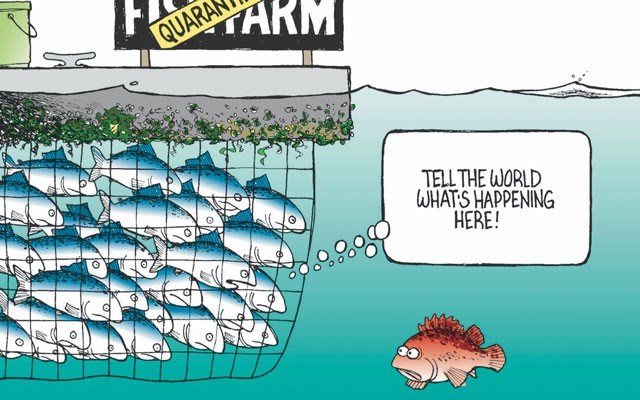Audacious. Arrogant. Call it what you will, the idea that we humans can farm fish in the ocean and expect anything less than trouble is so audacious and arrogant it would be laughable — laughable, as in a big sarcastic "ha-ha," if only it weren't so atrocious and wrong-minded.
For people who've been advocating for land-based fish farms for years, yet another nightmare has come true. A net pen that collapsed Aug. 20 at a San Juan Island fish farm released thousands of Atlantic salmon into the wild. The pen held about 305,000 fish. But more than a week later, officials for the parent company, Cooke Aquaculture, still say they don't know how many fish escaped. Apparently, "many fish" are still in the nets.
In trying to pin down the number of escapees I found two conflicting statements: 1. Cooke is waiting until conditions are right to send divers down to examine the net pens. 2. Cooke is waiting until harvesting is completed to do the inventory on the numbers released. (This from a post on the company's website.)
The Lummi Nation in Washington reports catching some 20,000 Atlantic salmon in Puget Sound in only a couple of days. If that many have been caught in one area in such a short time period, we can only imagine how many more are out there.
Beyond the troubling vagueness around the number of escaped salmon, I can only say, sorry, but as a communications specialist I'm not sure just how much of Cooke's line I'd swallow regardless.
First, early on, one of their spokespeople said the net pen failed due to high tides combined with the solar eclipse! (See an Aug. 22 CBC report, "Thousands of Atlantic salmon escape fish farm near Victoria after nets damaged.") What a load of crap! That's like something from the Dark Ages or, worse, a Trump tweet! Once scientists publicly debunked that myth, the "solar eclipse" line disappeared. (Wonder who got thrown under the bus for that one...)
Secondly, I'm glad to see the good journalists at CBC and elsewhere publicly document that the nets on the farm showed so much instability a month earlier they needed emergency repairs. When I hear something like that and see no public details about how those pens were stabilized, my antennae are on red alert.
Sorry, again, but after selling the Whistler Question, I worked in communications for the largest forestry company in Canada. Just like any other industrial sector, there are good forest companies and bad ones. The one I worked for happened to be pretty damn good.
In the end, big was also good. The company was powerful enough to lead huge changes in the forest industry for the better — something many of its employees, including us in communications, were advocating along with the activists on the front lines.
Eventually, public outrage over clearcut logging and the way it was done in Clayoquot Sound led to solutions that included more scientifically-sound harvesting and partnering with First Nations to create better ways of doing business, socially and environmentally. Spell that s-u-s-t-a-i-n-a-b-l-e.
Yes, farmed fish can help feed the world's growing population. Yes, fish farms create jobs. No, we don't know exactly what impacts these escaped Atlantic fish will have on wild stocks. But with wild Pacific salmon suffering impacts from climate change, pollution and other human-caused stressors — including diseases and parasites caused by ocean-based fish farms (see Alexandra Morton's excellent website, for details), let's take the word of concerned marine biologists over that of farmed salmon apologists and harness public outrage over this incident into something better.
Let's get fish farms out of the oceans and onto land. (B.C.'s own sorry fish farm saga started in the '80s when Norwegian companies were lured to our coasts by weaker regulations, just as Norway's government was clamping down.)
Cooke Aquaculture, also a big Canadian corporation, could lead the way just as that big Canadian forest company did years ago. The company says it's committed to investing in the farm's infrastructure to bring it up to "Cooke's high standards," but why stop there? Why not turn this fiasco into a model land-based fish farm?
Unfortunately, one of the things in the way right now is on the company's own website. Under "Corporate Values" they list "Entrepreneurial Spirit" first and "Environmental Sustainability" dead last. Like so many companies today — still — Cooke apparently doesn't recognize that a good, healthy environment is inseparable from what's good for the economy, and everyone.
Someone who can articulate this far better than I can is the self-described free-range conservationist Harvey Locke. Locke lives in Banff, that other mountain town that's learned to live with nature, not over it. Besides coining "Nature Needs Half" as a conservation goal, he beautifully articulates the need to realize what Indigenous people have known for ages: We aren't lords over the natural world. We are part of it.
To that end, besides urging you to never let a piece of farmed salmon cross your lips until it comes from land-based farms, I suggest a visit to Whistler's Squamish Lil'wat Cultural Centre. Their capable hosts can explain how Indigenous people in this area have traditionally caught and used salmon. You can also enjoy some tasty chowder or cedar-planked salmon, thanks to executive chef David Li who ensures that all salmon served is wild from B.C.'s coast.
Until September 24 you can also get inspired in Vancouver by Nettie Wild's fabulous art installation, Uninterrupted — a visual and musical feast portraying the life cycle of wild salmon that's projected onto the underside of Cambie Street Bridge. A prolific director, Wild was also one of those intrepid activists on the front lines of Clayoquot Sound years ago.
Here's to Nettie and more activism — this time for the salmon.
Glenda Bartosh is an award-winning journalist who went to J-school to change the world.




